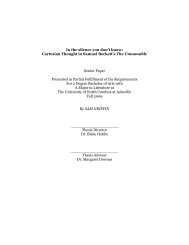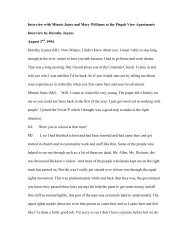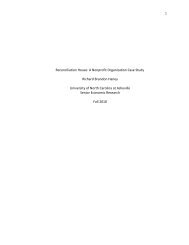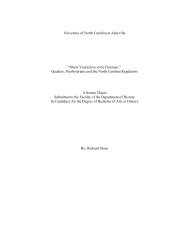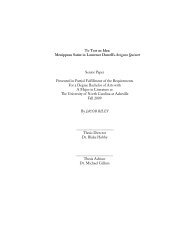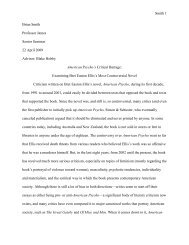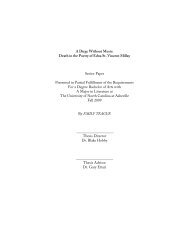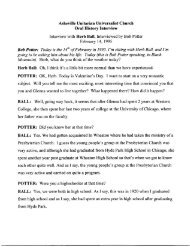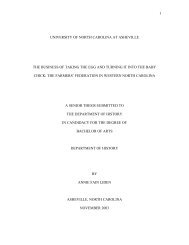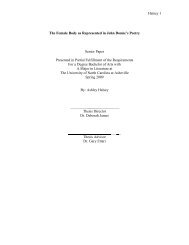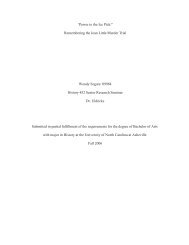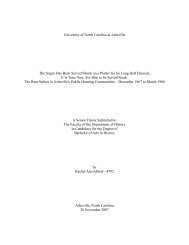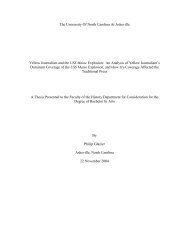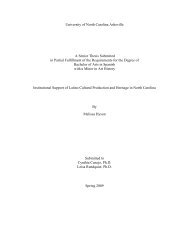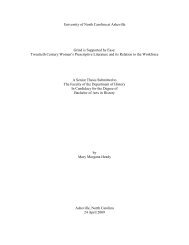Mark Twain's Writing During his Last Twenty Years: The Conflicts of ...
Mark Twain's Writing During his Last Twenty Years: The Conflicts of ...
Mark Twain's Writing During his Last Twenty Years: The Conflicts of ...
You also want an ePaper? Increase the reach of your titles
YUMPU automatically turns print PDFs into web optimized ePapers that Google loves.
Arghiere 2<br />
Unlike much <strong>of</strong> <strong>his</strong> earlier writing, most <strong>of</strong> <strong>Mark</strong> Twain’s later work presents a grim view<br />
<strong>of</strong> the human race. From roughly 1895 onwards, Twain’s writing contains few <strong>of</strong> the features for<br />
which it first gained recognition: frontier humor, as in “<strong>The</strong> Celebrated Jumping Frog <strong>of</strong><br />
Calaveras County” (1867); commentary on rural American life, as in <strong>The</strong> Adventures <strong>of</strong> Tom<br />
Sawyer (1876) and <strong>The</strong> Adventures <strong>of</strong> Huckleberry Finn (1884); and satirical social criticism, as in<br />
<strong>The</strong> Innocents Abroad (1869) and <strong>The</strong> Prince and the Pauper (1881). Rather, many <strong>of</strong> <strong>his</strong> later<br />
works deal with philosophical concerns: psychological egoism (the theory that all acts are<br />
primarily self-interested), determinism, and solipsism. <strong>The</strong>se concerns appear in Twain’s later<br />
correspondences; in <strong>The</strong> Mysterious Stranger Manuscripts (published posthumously in 1969), a<br />
collection <strong>of</strong> three unfinished narratives; and in What Is Man? (1906), a Socratic dialogue which<br />
Twain called <strong>his</strong> “Bible” (“535. Clemens To Howells” 689). By reviewing the philosophical ideas<br />
in these works we can gain insights into several conflicts in Twain’s writing which brought about<br />
a dramatic shift in style and a radically different depiction <strong>of</strong> the human race.<br />
Despite the wealth <strong>of</strong> criticism on Twain’s later works and views and on the conflicts<br />
inherent in them, few critics have explored in depth the significance <strong>of</strong> Twain’s passionate<br />
interest in several eighteenth- and nineteenth-century ideas and movements for <strong>his</strong> later thought,<br />
writing, and response to injustice and personal tragedy. A review <strong>of</strong> Twain’s letters, as well as a<br />
list <strong>of</strong> the authors he read and revisited, reveals that he held, especially later in life, a strong<br />
interest in rationalism, realism, Darwinism, social Darwinism, and empirical science. His works<br />
and ideas also bear many <strong>of</strong> the marks <strong>of</strong> naturalism, although he did not himself identify with<br />
the movement (<strong>Mark</strong> Twain and Science 210). On the whole, Twain’s interests reveal a<br />
predominantly materialistic conception <strong>of</strong> the universe. <strong>The</strong>se interests and t<strong>his</strong> conception, in



